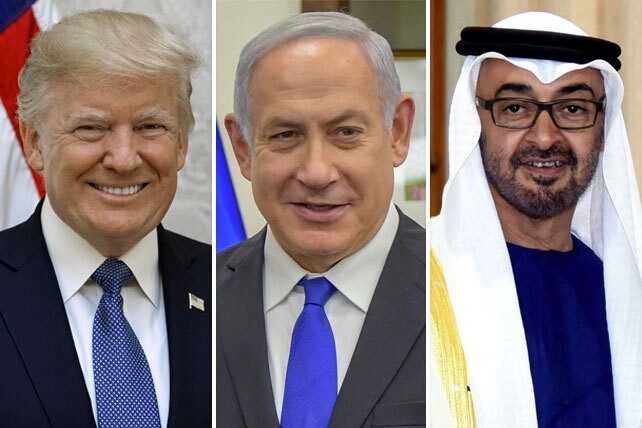by Giorgio Cafiero and Claire Fuchs
On August 13, the United Arab Emirates (UAE) and Israel formalised bilateral relations. Although historic, the US-brokered deal was not surprising given the extent to which Abu Dhabi and Tel Aviv had already established a tacit partnership. Now, many are wondering if/when other Gulf Cooperation Council (GCC) members will follow the UAE’s lead.
Having survived under a Saudi- and Emirati-imposed blockade since mid-2017, Doha does not feel pressure to follow in the UAE’s path. In the past, Doha sought to be a loyal ally of Saudi Arabia and the UAE. But the days of Qatar having to show solidarity with these neighbours are over. Today, Qatar is truly free from their orbits of influence.
‘Soft-power’ is important to Qatari foreign policy, which is connected to narratives about social justice, human rights, and defending pan-Arab causes including Palestine, suggesting that Doha will not formalise relations with Israel. In this sense, the UAE-Israel deal could advance Doha’s interests. As Samuel Ramani, a doctoral researcher at the University of Oxford, argues, Abu Dhabi and Tel Aviv’s formalisation of relations could benefit Qatar in the sense that the deal “will be able to burnish its soft power as a defender of Palestinian rights”. The Qataris would “lose a lot of credibility with Arab publics everywhere if they did immediately normalise relations with Israel following what the Emiratis did,” according to Dr. Courtney Freer, a research fellow at LSE Middle East Centre.
At the same time, we must not ignore a history of Qatari-Israeli engagement and coordination. Following the 1991 Madrid Conference, Qatar joined other GCC members in establishing diplomatic contacts with Tel Aviv. Emir Sheikh Hamad bin Khalifa bin Hamad’s ascendancy to the throne in 1995 marked a new period in Qatar, in which the country liberalised and adjusted its foreign policy in various ways such as exploring dialogue with Israel.
In 1996, Qatar’s government launched Al Jazeera, a revolutionary satellite channel that broke almost every unwritten rule in the world of Arab media. It was the first Arab network to invite on Israeli officials — then a huge taboo. Also in 1996, Israel opened a trade representative office in Qatar, yet in 2000 Qatar shut down the office to show solidarity with the Palestinians amid the Second Intifada. The Israelis, however, kept a “token presence” in Doha through their mission. This lasted until early 2009, when Qatari authorities permanently closed it in response to Israeli war crimes committed during the 2008/2009 war on Gaza.

Yet the trade office shutting down in 2009 did not end Qatari-Israeli engagement. In May 2013, Israel sent a trade delegation to Doha for discussions about potential Qatari investments in Israel’s technology sector even though it is not clear what, if anything, came out of that visit.
Last year, Qatar hosted the 9th Artistic Gymnastics World Cup Series. Israeli athlete Alexander Shatilov won a gold medal. After the Israeli national anthem played, many Qataris and Arabs lividly accused officials of betraying the Palestinians.
Moreover, for a number of years Doha has been providing humanitarian aid to the besieged Gaza strip. Notable is that Qatar has done this in coordination with Israeli authorities. Doha has also served as a diplomatic bridge between Israel and Hamas, even between the US and Hamas too. Ultimately, despite Doha and Tel Aviv lacking official diplomatic relations, as well as instances of Israeli politicians lashing out at Qatar for its links to Hamas, it is fair to say that Israel has valued its pragmatic relationship with Doha.
Washington is a factor. Throughout the Gulf feud, Qatar’s leadership has been keen to stay on excellent terms with President Donald Trump. Dr. Mahjoob Zweiri, the Director of Gulf Studies Centre at the University of Qatar, explained, “The UAE-Israel treaty may add some political pressure on Qatar when it comes to relations with the US, especially if Trump stays in the White House.” A concern for Doha is that the Abraham Accords could solidify the UAE as the White House’s closest Gulf partner if it remains the only Arab Gulf state to have full-fledged diplomatic relations with Israel.
Looking ahead, Qatar will see the question of normalisation of relations with Israel as a sensitive dilemma. There will be perceived costs and benefits that Doha will need to consider carefully. Most likely, Qatari officials will observe how the region reacts to the Abraham Accords, especially if the UAE faces major blowback. Despite being an “enemy” of Abu Dhabi, Qatar will be able to learn much about what a GCC state formalising diplomatic ties with Tel Aviv entails based on the UAE’s experience in taking this bold and controversial step.
Giorgio Cafiero (@GiorgioCafiero) is the CEO of Gulf State Analytics (@GulfStateAnalyt), a Washington, DC-based geopolitical risk consultancy.
Claire Fuchs (@Clairee_Fuchs) is an intern at Gulf State Analytics.
The views and opinions expressed in this article are those of the authors and do not necessarily reflect the official policy or position of Doha News, its editorial board or staff.







